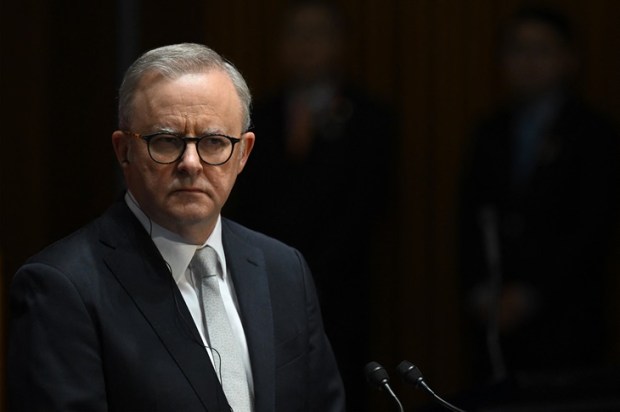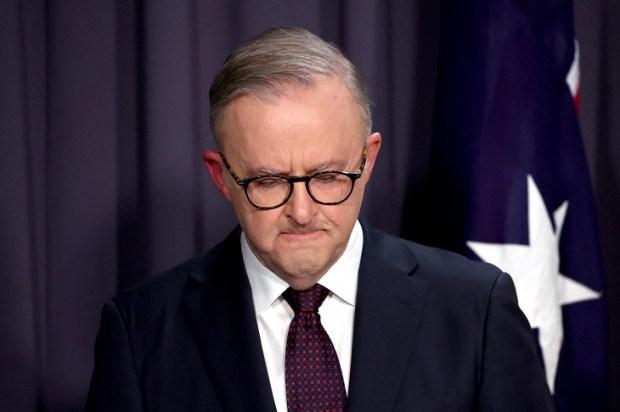I’m starting to wonder if Chris Kenny has been moonlighting as Daniel Andrews’ media adviser. The techniques they use to ward off any and all probing questions are eerily similar.
The Double Standard.
Take for example, Kenny’s technique of always preceding any comment on statements made by Warren Mundine by noting, ‘He was once in favour of a Voice. He’s entitled to change his mind of course but…’ Clearly, the implication is that Mundine is now being disingenuous in opposing the Voice for some obscure reason.
But Kenny does not apply the same standard to Dr Megan Davis who once said, ‘The Uluru Statement is 18 pages long …’ His excuse for Davis is that she just spoke carelessly. On numerous occasions.
Or to Noel Pearson, who has clearly linked the Voice to treaties – a connection that Kenny vociferously rejects.
The Obtuse Angle.
Kenny says both the ‘Yes’ and ‘No’ campaigns want a Voice. The only difference is that ‘Yes’ wants it in the Constitution and ‘No’ wants it legislated. That is the only difference between the two camps he says, implying, ‘So where’s the issue?’ Totally ignoring that the point of difference is entrenchment in the Constitution.
The Misinformation.
Following on from the last point, Kenny repeatedly claims that the Opposition has committed to legislate a Voice. Peter Dutton has said, during this campaign, a Coalition government would not legislate a national Voice, but it would look at local and regional voices. And, even if he had committed to a legislated Voice, the ‘No’ campaign is not just Peter Dutton. Kenny’s friend Senator Jacinta Nampijinpa Price has opposed a Voice in any form, as do I and many other commentators, because we can see it will be an expensive white elephant even in its own right.
They Know That’s a Lie.
When you don’t have a rigorous defence of your own position you resort to accusing your interlocutor of lying. For example, when Peta Credlin says the Uluru Statement is 26 pages long, Kenny’s response? ‘She knows that’s not true.’ When Jacinta Price, or Amanda Stoker, argue that the lack of any reference to ‘advice’ in the wording of the new provision means that the Voice will have more power than we are being told, Kenny’s response? ‘She knows that’s not true.’ Kenny is, in effect, calling these people liars. And this is the man who calls for a respectful debate.
The Scaremonger Ploy.
This is an oldie but a goodie, deployed to good effect by Julia Gillard, for example, when she classified Tony Abbott’s campaign against Labor based on a possible carbon tax, as a ‘scare campaign’. And we know how that turned out.
This is Kenny’s major rebuff to the ‘No’ campaign. That it is a scare campaign based on fearmongering. What this means is that your opponent does not really believe the reasons he/she is advancing, but they have some secret agenda. The good thing about this ploy is that you don’t have to state what that agenda might be, just hint at it. It could be that ‘No’ campaigners are closet racists who do not want to see Aboriginal people advance.
If Kenny thinks accusing his opponents of disingenuousness contributes to a respectful debate, he might like to think again.
The Partisan Ploy
This is the claim that ‘No’ campaigners have embraced a partisan position. Both Chris Kenny and Nicki Gemmell made this accusation in a recent Weekend Australian, but they are not the only ones pushing this line. They might claim that this is, effectively, the secret agenda that is at the heart of the purported fearmongering. Partisan means based on party politics, rather than the merits or otherwise of the Voice. I don’t know if Peter Dutton is motivated, solely or even primarily to promote a ‘No’ vote in order to inflict a political defeat on Prime Minister Albanese and hang the consequences for the Aboriginal people. I sincerely suspect not. But I would point out to Kenny et al, that the ‘No’ campaign was well advanced – championed by Jacinta Price, Warren Mundine, most Sky News Australia presenters, most News Corp journalists, the folks at the IPA, and us here at The Spectator Australia – long before Dutton committed the Coalition. And if the now 60 per cent of voters planning on voting ‘No’ are motivated by the desire to give the Coalition a political win over Labor, then one would expect this sentiment to also be reflected in the 2PP polling. But the reverse is true.
The Fingers in the Ears.
Here I return to the putative advisory nature of the Voice and the contention that the absence of the words ‘advice’ or ‘advisory’ suggests the Voice will have more power than we are told. Kenny’s response:
This is simply untrue. The Voice is advisory only. Price and the Coalition and their legal advisers must know this. In fact, as I’ve mentioned here before, the only reason the words ‘make representations’ are used is to make doubly sure all the politicians and lawyers and courts know very clearly that there is no obligation on government to act on whatever views come from the Voice.
The suggestion that, in order to make it perfectly clear that the Voice is advisory only, one must avoid all use of the words ‘advise’, ‘advice’, or ‘advisory’ and replace them with the more opaque ‘make representations’, is absurd.
The question that both Jacinta Price and Amanda Stoker should have asked is, why do the words ‘such representations will not be binding on either the Parliament or the Executive Government’ not appear… Surely that would solve the dilemma of the esoteric semantics of the word ‘advice’?
I have posed this question on numerous occasions, at least once, directly to Kenny. But he has never addressed this question.
And the other example of this technique is his standard defence against detailed arguments for which he has no adequate response: ‘There are some reasonable arguments against the Voice. I just don’t buy them.’ He uses this in tandem with his cherry-picking of his sources, citing ‘many former judges and legal experts who have said the Voice is legally sound’ (or words to that effect) and totally ignoring the many experts, e.g., former High Court Judge Ian Callinan, who take the opposite view.
The Government Knows Best Ploy.
It is hard to reconcile the rigorous Kenny who opposed lockdowns, calls out the destruction of our energy sector by governments of both political persuasions, the dismantling of our borders by the Rudd/Gillard governments and many other modern governmental atrocities, with the spin merchant who tells us that if the Voice tries to get above itself, it will be restrained by a sensible government. Like, for example, the Andrews government in Victoria.

























